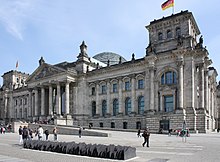Clara Schuch
Clara Schuch , b. Bohm, sometimes also Klara or Bohm-Schuch (born December 5, 1879 in Stechow , Westhavelland district , † May 6, 1936 in Berlin ), was a German SPD politician and writer.
Life and work
She grew up as the daughter of poor small farmers with five siblings. After attending the village school in Stechow, she later worked as a maid. Clara Bohm then graduated from business school in Berlin. She then worked as a clerk and secretary, finally as chief secretary and until her wedding to Willy Schuch in 1906 as a commercial correspondent . She was actively involved as a writer in the workers' welfare , wrote poems and essays and spoke at congresses and meetings. A particular concern of her was the fight against the high infant mortality rate in Germany; she called for the establishment of maternal advice centers. She worked on child protection commissions and, together with Emil Wutzky, made it possible to open the first Berlin home for working youth. During the First World War , the social welfare of children was again the most important concern for her. From 1919 to 1922 she was editor-in-chief of the SPD women's magazine Die Gleichheit .
MPs
Clara Schuch was a member of the Weimar National Assembly in 1919/20 and in the parliamentary committee of inquiry into the guilt issues of the world war . Then she was a member of the Reichstag until 1933 . In parliament she campaigned in particular for the protection of mothers and children. As in the last SPD parliamentary group meeting before the adoption of the Enabling Act of Reichsbanner chief and deputy Karl Höltermann suggested not to take part in the vote because he by members of the Center had been warned that SA will no longer Socialist MEPs alive from the Kroll Opera leave, saying she and Louise Schroeder vehemently oppose staying away.
time of the nationalsocialism
After the National Socialists came to power , she was imprisoned in the Berlin women's prison on Barnimstrasse in August 1933 . She was only detained for 15 days, but was psychologically devastated afterwards. After she was released, she had to report to the police regularly.
She died on May 6, 1936. Clara Schuch was buried on May 12, 1936 at the Baumschulenweg cemetery in Kiefholzstrasse in Berlin-Baumschulenweg . 5,000 people came to the funeral, which was seen as a silent protest against the Nazi regime.
Honors
The Bohm-Schuch-Weg in Berlin-Neukölln has been named after her since 1966 . Since 1992 one of the 96 memorial plaques for members of the Reichstag murdered by the National Socialists has been commemorating Schuch near the Reichstag in Berlin .
Works
- The children in world wars . International correspondence, Berlin-Karlshorst 1916.
- Alfred Mansfeld (Ed.): Social Democracy and Colonies. With contributions by Eduard Bernstein , Clara Bohm-Schuch. u. a. and a foreword by Julius Kaliski . Publishing house of the socialist monthly books, Berlin 1919.
- Clara Müller-Jahnke : I confess. A woman's story . Preface by Clara Bohm-Schuch. JHW Dietz Nachf., Berlin 1920.
- To the girls! In: Workers' Youth . 1921. Digitized
- Do you want to hear me Wake up call to our girls . Association of Workers' Youth Associations in Germany, Berlin 1922.
- Why the cooperation of women in the party organization? In: Women in politics, party work, workers' welfare, educational work! Report from the women's conference of the Hamburg-Nordwest district of the Social Democratic Party of Germany on October 4th and 5th, 1924 in Bremerhaven . Schmalfeldt, Bremen 1924.
- Introduction to the world of ideas of socialism . 1928.
- The way of the pub act . In: Arbeiterwohlfahrt . 3 (1928), No. 3, pp. 69-74.
- Poems . Victor Otto Stomps publishing house , Berlin 1932.
- Oliver Igel (Ed.): Clara Bohm-Schuch. "Human longing". Poems and short prose from the history of social democracy . trafo Literaturverlag, Berlin 2013 ISBN 978-3-86465-028-4 (= search for traces 9)
literature
- Martin Schumacher (Hrsg.): MdR The Reichstag members of the Weimar Republic in the time of National Socialism. Political persecution, emigration and expatriation, 1933–1945. A biographical documentation . 3rd, considerably expanded and revised edition. Droste, Düsseldorf 1994, ISBN 3-7700-5183-1 .
- Klara Bohm-Schuch . In: Franz Osterroth and Dieter Schuster: Chronicle of the German Social Democracy. Volume 1: Until the end of the First World War. JHW Dietz Verlag Nachf., Bonn and Berlin 1975, p. 32.
- Antonius Lux (ed.): Great women of world history. 1000 biographies in words and pictures . Sebastian Lux Verlag , Munich 1963, p. 71.
- Claudia von Gélieu : Pioneering Neukölln women. From the Britz princess to the first city councilor . trafo verlag, Berlin 1998, ISBN 3-89626-148-7 , pp. 120 ff, 141 ff, 236 f.
- Karin Jaspers / Wilfried Reinighaus: Westphalian-Lippian candidates in the January elections in 1919. A biographical documentation , Münster: Aschendorff 2020 (publications of the Historical Commission for Westphalia - New Series; 52), ISBN 9783402151365 , p. 175.
Web links
- Literature by and about Clara Schuch in the catalog of the German National Library
- Clara Schuch in the database of members of the Reichstag
- Clara Bohm-Schuch to the 75th anniversary of Oliver Igel - "Come, golden Freedom Day, I wait your" accessed
Individual evidence
- ↑ Ilse Fischer: The estate of the Reichstag member Clara Bohm-Schuch in the AdsD archive of the Friedrich-Ebert-Stiftung , accessed on September 16, 2016
| personal data | |
|---|---|
| SURNAME | Schuch, Clara |
| ALTERNATIVE NAMES | Bohm, Clara (maiden name); Schuch, Klara; Bohm-Schuch, Clara 14. March 2015 |
| BRIEF DESCRIPTION | German politician (SPD), MdR |
| DATE OF BIRTH | December 5, 1879 |
| PLACE OF BIRTH | Stechow , Westhavelland district |
| DATE OF DEATH | May 6, 1936 |
| Place of death | Berlin |


